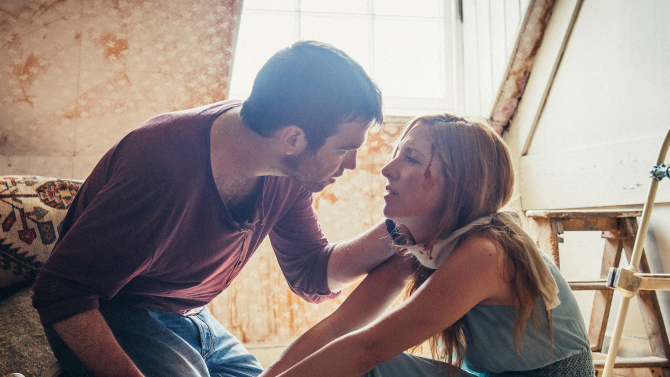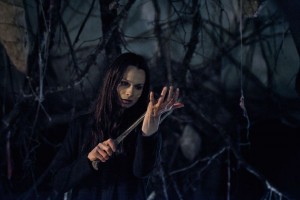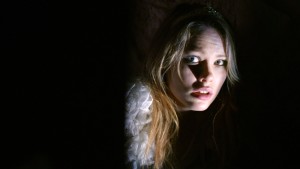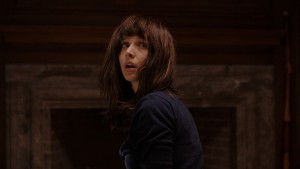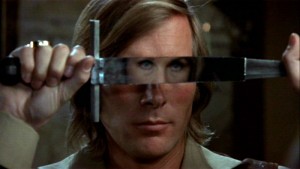By Cleaver Patterson.
Modern films can be hard to categorise: with so many increasingly open to different interpretations it is often hard to single out one core theme or trait. Fortunately though, this is not a problem often encountered by those that fall within the horror genre, and particularly for those screened at the CH4 FrightFest 2015, which took place at the VUE cinema in London’s Leicester Square over last summer’s August bank holiday weekend. Since the festival many of the films shown have received cinematic and DVD releases, with others due during the early months of 2016. Selected ones have also be available to download directly at home via the new social community-building label FRIGHTFEST PRESENTS, launched in the autumn by Icon Film Distribution in conjunction with FrightFest.
So, of the films shown during the festival which, if any, warrant closer attention from horror fans as well as the wider cinema going public? With several of the films screened having similar themes – witchcraft, possession, messing with your mind – it was quite easy to pare most together in a range of thematic duos, creating a virtual pick-and-mix of cinematic terrors. Witchcraft and the children of the devil have gone hand in hand with horror, since the very conception of the genre in the early days of cinema. As a result, you would think that two of the festival’s most eagerly anticipated films would have had everything going for them. Unfortunately, while both were visually strong – heavy on atmosphere and mood – each lacked that illusive, magic ingredient, which casts a spell on audiences.
One could be forgiven for thinking that a film like Cherry Tree – directed and written by David Keating and Brendan McCarthy respectively, who were responsible for the recent Hammer shocker Wake Wood (2010) – would provide some superior and edgy chills. However, despite a few effectively creepy moments, this tale of witches and bogeymen heavily laced with Celtic charm is, in the end, little more than a kid’s fairy tale spiced up for a teenage market. Set in contemporary, rural Ireland, the film follows Faith (Naomi Battrick) who, upon discovering that her father Sean (Sam Hazeldine) is dying of cancer, turns for help to Sissy (Anna Walton), her mysterious games mistress at school, who promises that she can help Sean, for a price. Unfortunately Faith soon discovers that Sissy’s assistance may cost her more dearly than she was initially led to believe.
Several films in the past – including Night of the Eagle (1962) featuring Peter Wyngarde and The Witches (1966) with Joan Fontaine – have attempted to mix schoolroom drama with occult practitioners with varying degrees of success. Where these other films have succeeded by leaving much of the more grisly goings-on up to the viewer’s imagination, Cherry Tree succumbs to the modern belief that to achieve real horror you must show everything in all its bloody glory. Though Battrick and Walton give fine performances as the bewildered and increasingly terrified young Faith, and disturbingly sinister Sissy whose idea ideas for extracurricular activities are far removed from a traditional game of jolly hockey-sticks, this drama is more lacklustre hokum than feisty hocus-pocus resulting in an exercise which struggles to raise little more than a mild shudder, despite an admittedly unexpected twist in the closing frame.
If Cherry Tree at least manages to hold the viewer’s attention for most of its eighty-five minute running time, the disappointing Hellions fails to do even that. Taking inspiration for much of its initial setup from the legendary Halloween (1978), director Bruce MacDonald’s film has the teenage Dora (Chloe Rose) left minding the house when her mother takes her young brother trick-or-treating on Halloween night. With her friends all out ‘partying,’ Dora prepares to spend an evening indoors in an attempt to avoid the magic and mayhem going on outside. However, she didn’t count on the group of strange kids who come knocking on her door – kids whom she soon discovers are a pack of little devils with anything but innocent games on their minds.
It’s hard to know where to start with Hellions because in truth, during its eighty minute running time, very little really happens. After Dora’s confinement to her house – and we find out what the brats really want from her – there’s not much else taking place. Which is a shame. The small town America where Dora lives is beautifully imagined on the screen, shot in muted tones with a photo negative feel which adds to an overall atmosphere of surrealism. That said, this does not do much to save a film that has the viewer caring little about what happens to its central protagonists, or even who some actually are – the origin of the title characters never being fully explained. All of which leaves you in a state of puzzlement as to what it is you have actually sat through. It seems strange that the most effective – and indeed horrific – films to be shown at a festival dedicated to the art of scaring the viewer senseless were not horror films in the generally accepted sense of the term. Two productions which stood out were thrillers that achieved their desired effect as much through the depiction of psychologically disturbing scenarios as by any full-on, in-your-face splatter effects of the type usually seen in films from the horror stable.
Body is the perfect example of a less-is-more mantra that seems to have bypassed many modern filmmakers, particularly those involved in the horror genre. Most now appear to believe that to create scares you simply pile on the gore and viscerality, forgetting the power of the mind to conjure up much worse imagery than can ever be depicted on the screen. Real life situations that, just about, could happen, are frequently much more disturbing than the monsters that litter many of the films which currently masquerade under the name of modern horror. Bored with yuletide festivities at home three friends, Holly (Helen Rogers), Cali (Alexandra Turshen), and Mel (Lauren Molina) decamp to party at the empty house of Cali’s uncle who is on holiday. Only after they make themselves comfortable do Holly and Mel discover Cali has been less than honest about her relationship with the owner of the deserted mansion. This, however, turns out to be the least of the trio’s problems, after they find that they’re not as alone in the house as they initially thought.
An effective, bare bones approach to filmmaking is something which permeates the very core of directors Dan Berk and Robert Olsen’s Body, with a tension reminiscent of Hitchcock’s ensemble masterpiece Rope (1948). At seventy-five minutes, here is a film which doesn’t outstay its welcome – unlike the unfortunate girls at its centre. Also, with a main cast of only four people – one of whom spends the majority of their time prostrate on the floor – and most of the action taking place within three or four rooms in one house, very little depicted onscreen is surplus. The freshness of the three girls who form the main cast – all relatively unknown on the big screen – plays in their favour: Turshen particularly stands out taking Cali from good-time, party-girl to manipulative young woman with disturbing ease. Played out against a to-die-for setting that drips laid-back decadence, Body is a classic example of wonderfully effective, pared back horror.
The same understated elegance at the heart of Body also permeates every aspect of South African born director/writer Abner Pastoll’s exquisite Road Games, another exercise in Hitchcockian tension with more noir-like u-turns than the roads of rural France where the twisted action plays out. With a cast headed by the legendary queen of 80s camp schlock herself Barbara Crampton, the film follows a young couple, Jack (Andrew Simpson) and Véronique (Joséphine de La Baume), as they make their way to England after meeting up whilst hitchhiking in rural France. Amidst rumours of a serial killer currently prowling the local countryside, they reluctantly accept a lift from a man called Grizard (Frédéric Pierrot) and his subsequent offer of a room for the night at the isolated manor house he shares with his wife Mary (Crampton). However, as the evening progresses and Jack and Véronique begin to learn more about the mysterious Grizard and Mary, they start to realise they may have made a serious mistake accepting the offer of accommodation from their seemingly genial hosts.
Right from the off, when Jack and Véronique are ‘kidnapped’ by the outwardly hospitable Grizard and Mary and trapped in the beautifully decayed French mansion where their hosts live, the viewer senses that all is not as it seems. The fact that the film sustains this mystery, holding your attention until the surprising twist at its conclusion, is a testament to both Pastoll’s skilfulness at bringing his own clever script to life on screen, as well as the talents of the four actors who bring this menacing game of cat and mouse to life. Crampton’s performance in particular stands out. By portraying Mary as a fragile woman constantly on the edge and whose personality feels as though it may crack at any time, she shows why her career has had a longevity not often seen in the insular world of horror cinema and why she is as much in demand now as when she first started in the 1980s. Focusing as much on psychological shocks as visceral visuals – though these also pepper the plot at unexpected intervals – Road Games proves that filmmakers do not have to sacrifice style and depth to create genuinely disturbing horror.
There really is truth in the old adage that they don’t make them like they used to. It’s become something of a tradition at FrightFest for the festival to stage screenings of past classics – often of films about to receive a digitally remastered Blu-ray or DVD rerelease by specialist distributors like Arrow Video. A veritable feast of gory masterpieces were screened this time round in smaller venues which fell under the umbrella of the Discovery Screens. Reliving the glory days of the Video Nasty, as well as those of Hammer Films, the film’s chosen reminded festival attendees of the good old days when horror was approached very much with a tongue in cheek attitude.
Captain Kronos – Vampire Hunter (1974) emerged during the period which marked the beginning of the end for the great Hammer Studios. Highly stylised, melodramatic and verging on the camp Captain Kronos works because, unlike many of the studio’s later vampire films this one stages its proceedings firmly in the past. Vampiric goings-on lend themselves – probably due to their fairytale like qualities – much better to pre-twentieth century Europe than contemporary England (or America for that fact), and Captain Kronos plays on these strengths with a late eighteenth / early nineteenth century air and a location in some undisclosed middle European kingdom. The plot of the film – featuring German actor Horst Janson as the hero, alongside stars of the day Shane Briant, Caroline Munro, Ian Hendry, Wanda Ventham and Hammer regular John Carson – is fairly basic. Kronos, an ex-army captain and legendary vampire hunter, travels from town to town ridding the local area of the plague of vampirism without which no authentic period European setting seemed complete. Which is really all there is to it. However, as with many Hammer films, plots only served to connect each set piece death with the next. What their audiences really wanted, and what the studio’s writers and directors – like Brian Clemens who undertook both roles here – gave them were handsome heroes, girls with ample, heaving bosoms and Kensington Gore by the bucket load.
If, however, you prefer your blood and dismemberment lingered over in loving detail, you could do worse than to have seen two films which took varying – though equally disconcerting – approaches to on-screen violence. The Mutilator (1985) – directed by Buddy Cooper and John Douglass, and featuring a cast including Matt Mitler, Ruth Martinez and Bill Hitchcock – is as subtle as its title suggests. Made at the height of the 1980s obsession with cinematic blood and guts, the film has all the standard requirements expected from this type of film – young all-American college students hanging out in an apparently empty beach house belonging to the family of one of them, plan on a weekend of sun, sea and sex. Instead they find themselves picked off, one by one, by an unseen killer, in a series of increasingly gruesome and graphic murders by everything from a sword and a pick to an axe and a large and glistening fish hook. Viewers may question the validity of films who’s existence seemed to solely for the purpose of making impressionable audiences jump in their seats. However, considering that films like The Mutilator still manage to achieve this aim even after thirty years, it surely means that they must have been doing something right.
Another film which also retains its ability to shock is the original, and unequaled, Hellraiser (1987). Directed by the British king of disturbing horror Clive Barker, and based on his story of the same name, the cult shocker – which, in the months since the festival, has received a restored Blu-ray release along with its sequels in a special edition boxset by Arrow Films – is one of those infamous films which requires little introduction. Even those who have not seen it will know the story of the young Kirsty (played with palpable terror by actress Ashley Laurence) who unwittingly becomes a pawn in a deadly game concocted by her dead uncle Frank (Sean Chapman) and his lover – and Kirsty’s step-mother – Julia (Claire Higgins), who between them attempt to quite literally raise hell. Add to this the introduction of Pinhead – one of the genre’s all-time anti-heroes, who sits rightfully alongside the likes of Freddy Krueger and Jason Voorhees – some zombie special effects which, even in the light of today’s hyper-realistic CGI, are still amazingly authentic, and a house thats outward appearance – let alone what goes on inside – should be enough to scare off any sane person, and Hellraiser remains one horror excursion which every film enthusiast should take at least once.
Cleaver Patterson is a film journalist and critic based in London. He is News Editor for the website Flickfeast, and regularly contributes to a number of other publications and websites including Rue Morgue, Video Watchdog, Scream and Film International.

